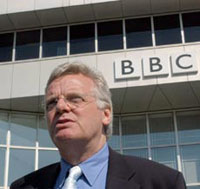
Okay, so no-one thinks the BBC is going to be doing cartwheels over the news that its chairman, Michael Grade, has
defected to ITV, but the corporation's treatment of the story this morning has been a disgrace. Sheila Fogarty's two-way with Jeff Randall on Five Live -
"I suppose the question to Michael Grade today is why he has accepted this million-pound job offer from ITV" - was fairly typical of the tone of the coverage.
Well, excuse me, but why is it considered such a crime in big media circles for someone to defect to a rival for a much higher salary? Especially, in this case, when you take into account Grade's historical and family connections with ITV.
The truth of the matter is that Michael Grade has earned himself a permanent place in the history of the BBC on account of two actions he took when he was the corporation's Director of Television in the mid-1980s.
The first of these was to start a weekly soap-opera, something that had never been done on the BBC before. It was called
EastEnders and, whether you love it or loathe it, without it the BBC would probably now be reduced to the status of America's tiny National Broadcasting Service.
The second of Grade's great achievements was arguably even more far-reaching. In July 1985, he took the unprecedented decision to clear 17 hours of programming time for a pop-concert, realising before anyone else at the BBC that
Live Aid was something that was going to be bigger than all of them.
His reward for that was to be overlooked for the Director-Generalship in 1987 and then sacked by John Birt. He owes nothing to the BBC, and has every right to fill his boots in what will certainly be his last TV job without carping from his former employers.
Mind you, the BBC is not alone in this. A year or so back, Heston Blumenthal decided he'd had enough of being the Guardian's Saturday food writer - fairly understandable when you consider that his restaurant has been awarded three Michelin stars and other media opportunities were opening up for him.
Last week, the Graun responded with this
unbelievably bitchy review of Blumenthal's book "In Search of Perfection," followed a day later by this
equally vitriolic piece on the TV programme of the same name.
Get over it, Mr Rusbridger.Update: The Guardian displayed its open-mindedness by featuring this post in its
Best of the Web listing on Comment is Free earlier today, although it's been taken down now. Meanwhile journalism blogger
Static Squid voices his agreement.

 The journalists' trade mag Press Gazette closed last Friday to general lamentation within the industry, but my sources tell me that despite officially having been made redundant, its dedicated team of scribes are still at their desks and hard at work. Whatever can it mean?
The journalists' trade mag Press Gazette closed last Friday to general lamentation within the industry, but my sources tell me that despite officially having been made redundant, its dedicated team of scribes are still at their desks and hard at work. Whatever can it mean?
